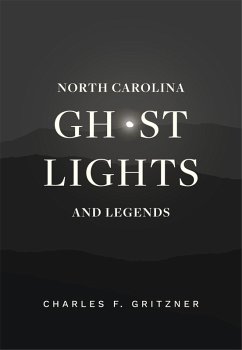
Hunting Old Moxie (eBook, ePUB)
The Largely True History of the Specter Moose of Lobster Lake, Maine

PAYBACK Punkte
4 °P sammeln!
Fifteen feet high. Twenty-five hundred pounds. Grayish-white in color. This was the common description of Old Moxie, otherwise known as the Specter Moose of Lobster Lake, Maine. His antlers spread twelve feet across and were spiked with over forty tines. His hoofprint measured ten inches wide. He had a double mane that fell on each side of his neck, and the "bell" hanging under his chin was eighteen inches long."Hunter Shoots at Monster Whose Existence Was Doubted," reported the New York Times on November 5, 1899: "A party of hunters have created great excitement among the sportsmen and guides...
Fifteen feet high. Twenty-five hundred pounds. Grayish-white in color. This was the common description of Old Moxie, otherwise known as the Specter Moose of Lobster Lake, Maine. His antlers spread twelve feet across and were spiked with over forty tines. His hoofprint measured ten inches wide. He had a double mane that fell on each side of his neck, and the "bell" hanging under his chin was eighteen inches long.
"Hunter Shoots at Monster Whose Existence Was Doubted," reported the New York Times on November 5, 1899: "A party of hunters have created great excitement among the sportsmen and guides here by the announcement that they have seen the great gray moose that has haunted the vicinity of Lobster Lake for the past seven years."
And the Times wasn't the only national paper breaking the news that day.
The Boston Herald: "The king of all Maine moose, sometimes called the 'spectre moose,' because of the weird appearance of the gray monster at night, has again been seen near Lobster Lake, and the news has set the sportsmen, native hunters and guides crazy to get a shot at him."
The Boston Globe: "For years and years there has been an enormous moose in the region around Moosehead Lake."
The Boston Journal: "Formerly this moose was regarded as a mythical creature-a monster conjured up by excited imaginations, but lately it has been demonstrated that he really exists, and that he is as big as anyone has declared him to be."
The year 1899 was just the beginning. For over half a century the Specter Moose would reign as the crowned terror of the Maine Woods. They say that L.L. Bean wore out his first pair of boots in search of him. Big game hunter President Teddy Roosevelt wanted to pursue him. Big game maker Milton Bradley wanted to outplay those in pursuit. Governor Percival Baxter created a state park to protect him. And Fly Rod Crosby, Maine's femme venatrix fatale, thought he was just plain bad for tourism.
Sportsmen from across the country and around the globe rushed to the Maine Woods to get a crack at the Specter Moose. But the antlered abomination defied bullets, defied death, and defied logic. Civil War hero Joshua Chamberlain feared there would be no Appomattox in the Specter Moose War.
And he was right.
"Hunter Shoots at Monster Whose Existence Was Doubted," reported the New York Times on November 5, 1899: "A party of hunters have created great excitement among the sportsmen and guides here by the announcement that they have seen the great gray moose that has haunted the vicinity of Lobster Lake for the past seven years."
And the Times wasn't the only national paper breaking the news that day.
The Boston Herald: "The king of all Maine moose, sometimes called the 'spectre moose,' because of the weird appearance of the gray monster at night, has again been seen near Lobster Lake, and the news has set the sportsmen, native hunters and guides crazy to get a shot at him."
The Boston Globe: "For years and years there has been an enormous moose in the region around Moosehead Lake."
The Boston Journal: "Formerly this moose was regarded as a mythical creature-a monster conjured up by excited imaginations, but lately it has been demonstrated that he really exists, and that he is as big as anyone has declared him to be."
The year 1899 was just the beginning. For over half a century the Specter Moose would reign as the crowned terror of the Maine Woods. They say that L.L. Bean wore out his first pair of boots in search of him. Big game hunter President Teddy Roosevelt wanted to pursue him. Big game maker Milton Bradley wanted to outplay those in pursuit. Governor Percival Baxter created a state park to protect him. And Fly Rod Crosby, Maine's femme venatrix fatale, thought he was just plain bad for tourism.
Sportsmen from across the country and around the globe rushed to the Maine Woods to get a crack at the Specter Moose. But the antlered abomination defied bullets, defied death, and defied logic. Civil War hero Joshua Chamberlain feared there would be no Appomattox in the Specter Moose War.
And he was right.
Dieser Download kann aus rechtlichen Gründen nur mit Rechnungsadresse in A, D ausgeliefert werden.













